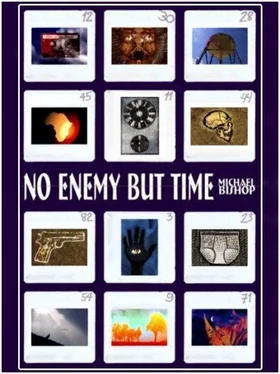Do you remember, when you were in your early teens you sometimes used to flaunt the nom de guerre Juan Ocampo? Usually you were pretending to be a Latin American shortstop on some major-league baseball team, but you also liked to sign that name to poems, to secret pacts with your boyhood friends, and to confidential Declarations of Independence from the tyranny of Mother and Father Monegal. These last documents you often managed to leak to the tyrants themselves by “caching” them in such out-of-the-way places as my American Heritage Dictionary or the catch-all drawer in Hugo’s workbench in the utility room.
Anyway, this behavior led me to suppose that you cherished the idea of an identity separate from the bourgeois one with which we had saddled you, and that one day you might try to inherit this alternative life. Maybe, in fact, this submerged identity would free you from the dreams that so frequently estranged you not only from us but from yourself. If he thinks that being Juan Ocampo will free him (I reasoned), he is very likely to go to Spain in search of the latent Juan Ocampo in his heart. The idea for the book I am now working on came to me as a pretext—a literal pretext—for following you to Spain.
And then Anna wrote to say you were going to Zarakal, shattering my hopes of finding you here and sentencing me to six months at hard labor on this brilliant book of mine.
The Reign in Spain (by Eliza Doolittle).
Anyway, I decided to find your mother. If she still happened to be alive. My researches were going to take me to Andalucía and Sevilla, in any case, and I might as well combine book business and my quasi-maternal curiosity to see what I could see.
Does the name Carl Hollis mean anything to you? Undoubtedly not. He was the intelligence agent who declared—during our interview in Colonel Unger’s office at Morón AFB almost a quarter of a century ago—that Encarnación Ocampo had disappeared, probably forever. I never knew if by that he meant that she was dead or that she had simply vanished into the concealing vastness of the countryside like a guerrilla fighter. Because the former assumption pretty much preempted hope, I decided to proceed on the latter.
A good thing, too, for, John-John, I found your mother.
Sam Spade and Phillip Marlowe have nothing on me, son—not, at least, when it comes to tracking Missing Mothers. (Missing Sons I am not so good at, even when they take up residence within spitting distance of their fathers’ last duty assignment. In a couple of other senses, though, I am damned adept at Missing You.) I won’t go into the details here. Suffice it to say that I returned to the tenement where Encarnación lived with you in 1962-63. Because I was obviously not a policewoman or a pusher of some vampirish sort, a surprising number of people talked to me. In many ways, after all, Encarnación was— is —a memorable figure, menacing or plucky depending on your point of view. I had always leaned to plucky—because, when she might have surrendered you to her despair, she saw you to the safety of Santa Clara.
Anyway, my informants—three of them, John-John—remembered your mother very well and gave me some profitable leads.
I traced Encarnación to an Andalusian village called Espejo. Here she is living today, Johnny, no longer either a prostitute or a black marketeer. She has redeemed her life in an extremely old-fashioned way, at least for the female of our species, and I will not presume any sort of political comment about this fact.
Not, at least, in this letter. You see, she is married to a robust, red-haired barkeep and bodega owner named Antonio Montaraz, who appears in his boisterous way to dote on her. She must be approaching the change of life, but she has had at least nine children by this man, the youngest a babe-in-arms whom she suckles between stints as a barmaid in Señor Montaraz’s dingy but prosperous hole-in-the-wall tavern. The children also help their father, and although there is a lot of public bickering and noise, the barkeep’s regime seems to be popular even among the older siblings. This is a tight-knit family, with both Antonio and Encarnación in stolidly traditional roles. It looks suffocating to me—pardon me, my slip is showing—but your mother seems to be more than content with her lot.
The principal question now in your mind is probably this: Did I talk to her? Tell her about you? Trot out my own maternal experiences as a counterweight to your mother’s? The answer to this question—these questions—is No, of course not . You see, Johnny, to the cheerfully busy Montarazes I was a dowdy/doughty Englishwoman, with a phrase-book command of Spanish, who had stumbled off a tour bus disastrously misrouted out of Córdoba. I did not try to correct this false impression.
Suppose that I had blurted out my story to Encarnación. Would she have recoiled from me as an evil messenger intent on destroying her present life with lurid tales of her past? It’s quite possible. Or suppose that my mentioning you, out of the hearing of her husband, had afflicted her with a terrible anxiety about your whereabouts, your safety, your happiness. Because I still cannot completely reassure myself on these points, I could not have reassured her, either. So I pretended to a tourist’s illiteracy and spoke only a little.
Do you, there in exotic Zarakal, remember your Spanish? Even a little? Well, the surname Montaraz means “wild, primitive, uncivilized,” and to some extent this is a perfect characterization of your little half-brothers and half-sisters. None is as dark as you, John-John, and I doubt seriously that any of them ever suffers cripplingly vivid dreams about prehistoric East Africa, but, in many respects, they are nevertheless a feral crew. Their mother signals them with rapid-fire hand gestures, which, even though they can all speak, they relay to one another with remarkable deftness, cutting their eyes for emphasis.
They communicate as effectively without words as with them, but they are noisy for Antonio’s sake. He is a raconteur and yowler who cannot keep his mouth shut.
I don’t think this is a milieu you would find especially compatible, but one day you may want to visit the Montarazes and decide for yourself. The address in Espejo is 17 Avenida de Franco. I caution you, however, to think about the likely impact of such a visit. The ramifications go far beyond the mere satisfaction of your filial curiosity.
That Encarnación is alive and happy in a world such as ours strikes me as a miracle, and miracles are their own justification. Although hope, faith, optimism, and the formidable power of what the late Dr.
Peale liked to call “positive thinking” are clearly essential to the progress of our species—toward what? toward what?—only a fool ignores the potential wartiness of both circumstance and the human heart. As a matter of fact, I approached my search for your biological mother as something of a fool’s errand, expecting from the outset to learn that she had hanged herself in an abandoned building, or suffered a fatal beating at the hands of a psychotic client, or surrendered to the ravages of venereal disease, or maybe even walked beneath a construction platform from which a scuttle of bricks had just fallen. I did not like to believe any of these possibilities, of course, but until my search ended, each seemed as likely as what has actually occurred. More likely, in fact, given your mother’s unpromising background and the prejudice against her as a bruja morisca . So cherish this miracle, Johnny, and think very carefully about your biological mother’s present happiness.
I also know what happened to your biological father, Lucky James Bledsoe. No miracle here. The bad news is that as a member of the Army’s First Cavalry Division he was killed twenty-one years ago in the Ia Drang Valley in South Vietnam. He had just turned eighteen. I discovered his fate by tracing his parents’ whereabouts through the Air Force locator service at Lackland.
Читать дальше



![Ally Carter - [Gallagher Girls 01] I'd Tell You I Love You But Then I'd Have to Kill You](/books/262179/ally-carter-gallagher-girls-01-i-d-tell-you-i-lo-thumb.webp)








